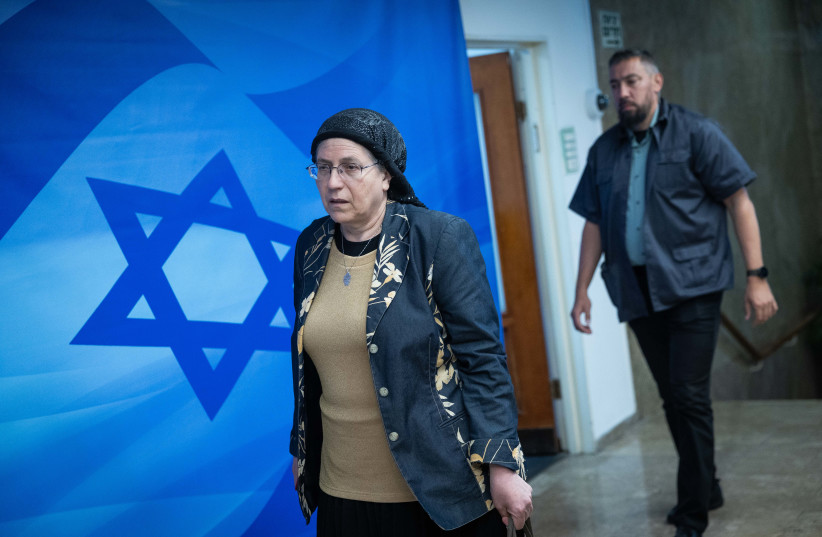Israeli government ministers, former security officials, and researchers met earlier this month to discuss Israel’s war-fighting strategy in a meeting organized by the Israel Victory Caucus, a group of right-wing parliamentarians led by Ohad Tal, from the ruling coalition’s ultraconservative Religious Zionism party, and Evgeny Sova, from the secular nationalist opposition party Yisrael Beitenu (Israel Our Home).
At the meeting’s outset, Tal proclaimed that “the Jewish people know how to win.”
He explained to The Media Line that in the 1948 and 1967 Arab-Israeli wars, “everyone knew that Israel had won and that the Arabs had lost.”
Today, however, Israel had lost its commitment to total victory, Tal said. He said that change began when Israel signed the Oslo Peace Accords with the Palestine Liberation Organization in the 1990s.
Israel and the PLO signed the Oslo Accords in 1993 and 1995, which created a framework for Palestinian self-government in the West Bank and Gaza Strip, established the West Bank’s A, B, and C areas, and began laying the groundwork for a two-state solution to the Israeli-Palestinian conflict. Following the assassination of Israeli Prime Minister Yitzhak Rabin by a right-wing Orthodox Jewish gunman in 1995, as well as numerous terrorist attacks and a cycle of failed negotiations, the Oslo process ground to a halt in 2000.

Impediments to peace
Tal said the best “way to achieve peace, as we have seen in the last 30 years, is not through concessions” or by maintaining the status quo. Instead, he said, Israel should return to the era of decisive military victories.
Yossi Kuperwasser, a former general who directed the Israeli military’s intelligence research division, said Israel had come to define victory as little more than gaining time between rounds of fighting.
Kupperwasser, now a director at the Jerusalem Center for Public Affairs, said Israel’s approach towards fighting Hamas forces in the Gaza Strip is a case in point.
Although Israel’s Gaza operations may have weakened the Islamist group’s infrastructure, he said, it has never been decisively dismantled. As a result, Kuperwasser said, the two sides remain locked in a cycle of violence.
Rabbi Leo Dee, who tragically lost his wife and two daughters in a terror attack in the Jordan Valley earlier this year, called on Prime Minister Benjamin Netanyahu to halt Israel's financial assistance to the Palestinian Authority (PA). He denounced the PA for glorifying terrorists responsible for the deaths of Israelis and said that the killers who victimized his family are lauded at certain Palestinian summer camps. Dee condemned the incongruity of the PA receiving funds from Israel and other international entities while simultaneously supporting terrorism. He urged the suspension of global financial support and an end to concessions to the PA by world governments.
Minister of National Missions Orit Strock told the meeting that Israel is focused on “managing events” rather than on a “decisive outcome.”
Strock, who belongs to the far-right Religious Zionism party, cited a passage from the Hebrew Bible suggesting that victory would be impossible until the Jewish people destroyed their Biblical enemy, the "Amalek" nation.
The presence of lawmakers from both the coalition and the opposition in the Victory Caucus was notable, given that Israel is mired in a serious political crisis.
The current government, the most right-wing and religiously conservative in Israel’s history, is pushing new laws that critics call a “coup.” The government says it is merely giving the parliamentary majority tools to fulfill the electorate’s wishes.
Hundreds of thousands of demonstrators have taken to the streets in protest against the government's plans.
Still, some members of the opposition share the coalition’s hawkish foreign policies.
Chief among these is the Yisrael Beitenu party, led by Avigdor Lieberman, who joined the opposition because he objects to Prime Minister Binyamin Netanyahu and his alliance with ultrareligious parties.
Tal and Sova said Israel should first dismantle the Palestinian “terror infrastructure” and only then seek peace.
Once Palestinians understood the full extent of Israel’s might, peace would follow, Sova told The Media Line.
“When the Palestinians know they cannot defeat us militarily, they will grow used to the fact that they need to coexist with Israel,” he said.
At that point, Israel would “extend its hand” and help the Palestinians “with their economy, health, and even their security,” Sova said.
Victory Caucus members disagreed about the nature of Israel’s relationship with its most important ally, the United States.
Tal said that media references to weakening US-Israeli relations were misguided.
“I can tell you they are only getting stronger and stronger. That's the reality,” he said.
On the other hand, Sova said that Israel’s relations with Washington are “currently in crisis” and that Israel ignores this at its peril.
“Those who ignore [the US-Israel crisis] are only hurting themselves and this caucus,” he said.
Some US politicians support the Victory Caucus’ message, with New York Republican congressman Mike Lawler telling the gathering that “long-term stability in the region rests on the acceptance of Israel’s legitimacy as a Jewish state.”
Tal agreed.
“We want to make everyone understand that Israel is here and it's here to stay. We're not going anywhere,” he said.
Hannah Levin is a student journalist with The Media Line’s Press and Policy Student Program.
